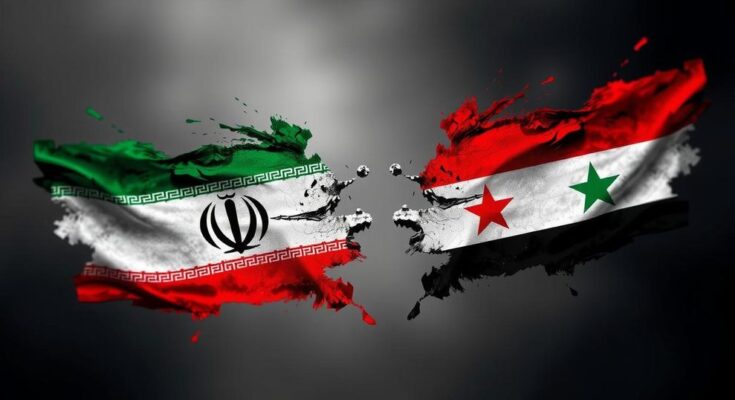The Syrian Foreign Minister Bassam al-Sabbagh visited Iran, meeting with Foreign Minister Abbas Araghchi to discuss regional cooperation amidst global tensions. Both nations reaffirmed their alliance, emphasizing Iran’s support for Syria as they navigate challenges posed by the U.S. and Israel. The evolving dynamics among major regional players underscore the importance of their partnership.
This week, the Syrian Foreign Minister Bassam al-Sabbagh made a notable visit to Iran, meeting with his Iranian counterpart, Foreign Minister Abbas Araghchi. Although the Iranian state media did not elaborate extensively on their discussions, it was reported that the pair deliberated on significant regional issues. Iran reaffirmed its unwavering support for the Syrian government, signaling the importance of this alliance amidst emerging global tensions and a shift in U.S. administration policy. The context for this emerging alliance is critical; Iran has been a steadfast supporter of the Syrian regime throughout its ongoing civil strife. With the incoming U.S. leadership, both Iran and Syria are contemplating the future of their partnership. Additionally, the potential escalation of conflict involving Russia’s actions in Ukraine could impact Syria, as Russia remains a crucial ally of the Syrian government. Any shift in Turkey’s relations with Syria, suggested by talks in Kazakhstan, could complicate the dynamics, especially for Iran, which may view such developments unfavorably. During their discussions, both ministers, being new to their roles, focused on cooperative strategies regarding Gaza and Lebanon, areas where Syria acts as a conduit for Iranian arms to Hezbollah. Such collaboration highlights the ongoing necessity for mutual support amid rising regional tensions, particularly with claims of Israeli operations proximate to the Syrian border. Iran emphasized its commitment to defending its sovereignty strongly in response to Israeli actions, decried as “warmongering.” Moreover, Iran is preparing to confront renewed pressure from the United States, particularly with the previous administration’s policies. The Syrian delegation expressed its opposition against Israeli military activities against Palestinian and Lebanese territories, further affirming their joined stance against perceived threats from Israel. Iran’s recent rhetoric indicates a strategic pivot, suggesting that preparing for conflict could facilitate stability and peace rather than provoke further aggression. As Iran and Syria observe the geopolitical chessboard, they are likely assessing Israel’s negotiations with the United States to relieve some sanctions against President Bashar Assad in exchange for controlling the flow of arms to Hezbollah. This interplay underlines the complexity of multinational relations in the region, particularly as the movements of Hamas towards Turkey may present new challenges. Iran’s engagement with Syria is therefore critical for solidifying its strategic interests in light of rapidly shifting alliances.
The Iranian-Syrian relationship has evolved significantly over the years, primarily driven by mutual strategic interests shaped by external pressures and regional alliances. Given the Syrian civil conflict and the broader geopolitical landscape, Iran’s support for Syria has manifested through military, economic, and political backing. The evolving relationship among Russia, Turkey, Syria, and Iran reflects a complex web of regional alliances that impact the dynamics of power in the Middle East. Recent U.S. policy changes add layers of uncertainty, compelling Iran and Syria to consolidate their partnership amidst external threats.
In conclusion, the meeting between the Syrian and Iranian foreign ministers signifies a strong commitment to their alliance as they navigate increasing regional tensions and global shifts. This partnership is crucial for both nations as they face external pressures from Israel and the evolving political landscape with the new U.S. administration. Direct engagements like these are essential for maintaining strategic cooperation while countering any emergent threats, ensuring that Iran and Syria bolster their positions in a volatile region.
Original Source: www.jpost.com




